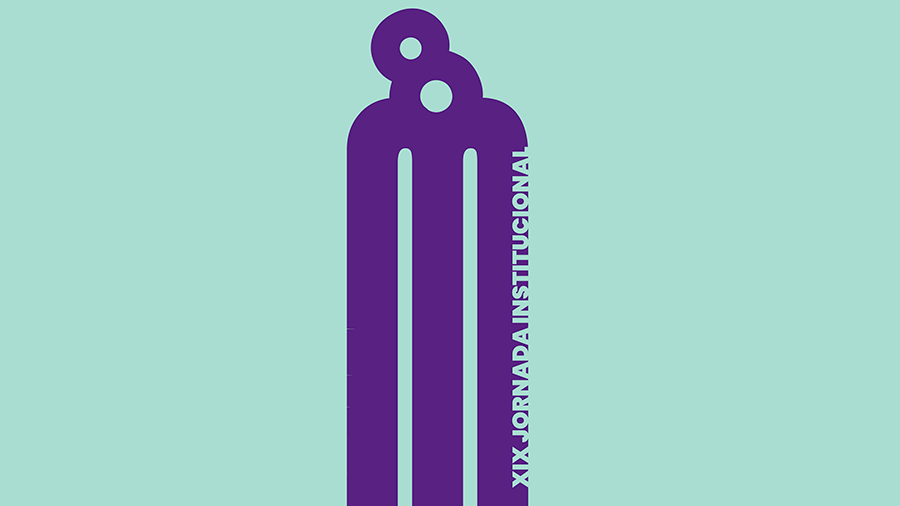The UAB to commemorate International Women's Day
This year the institutional ceremony commemorating International Women’s Day paid tribute to the work and commitment to gender equality of Dr Margot Pujal i Llombart, from the UAB Department of Social Psychology. The event, which was info-accessible, took place on 6 March at 12 noon at the conference hall of the Rectorat building an was live on Youtube.

The institutional event began with a brief introduction by UAB Secretary General Esther Zapater, which will be followed by Maria Prats, director of the Observatory for Equality, who presented the main results of the 5th Gender Equality Action Plan. The presentation was followed by the awarding of a distinction to Dr Margot Pujal i Llombart and a performance by the UAB Chamber Choir. Finally, Rector Javier Lafuente gave the closing speech.
Margot Pujal i Llombart received her PhD in Psychology from the UAB and has focused her research in social psychology and gender studies. Currently, she coordinates the DES-Subjectant.GESPI group, focused on the social study of subjectivity and subjection from an intersectional gender perspective. She was also coordinator of the Joan Rivière psychology and gender centre. Her latest articles talk about issues such as colonial gender systems, stigmas, sexual labour, debinarising gender, and gender-based violence.
Apart from the institutional event, 8 March will also include other activities which will be held in different UAB teaching centres and institutes:
- The Physical Activity Service (SAF) organises a variety of free sports activities for the women of the UAB community, such as the League of Women Champions. These activities form part of the programme “Les dones ens movem” running from 15 February to 21 May 2024, and which was launched as part of the UAB’s commitment to gender policies.
- Cultural en Viu and the Faculty of Education recovered the legacy of teachers from the Second Spanish Republic with a theatre play entitled “La primera i les mestres de la república”, which took place on Tuesday 5 March at 1:00 p.m. at the UAB Theatre Hall.
- The Faculty of Psychology offered a self-defense seminar for women on 6 March from 4:00 to 8:00 p.m. at the SAF sports hall.
- The Institut de Neurociències and the Faculty of Medicine organized an International Women’s Day seminar on women’s health under the title of “Donem visibilitat a la dona en l’àmbit de la salut” on 7 March from 1:00 to 3:00 p.m. at the Aula M5-001. The seminar included four conferences with gender perspective by health experts. In addition, the Library of Medicine offers two exhibitions: “Dones que ens inspiren a la Medicina” and “Medicina en perspectiva de gènere”. The entrance hall of the Faculty of Medicine will be the scenario of a participative activity entitled “Expressa’t: I tu, com ho veus i què li demanes al 8M?” which will be held from 4 to 8 March.
- The Women and Rights group of the UAB organised the conference "Mirades des de la recerca" on 7 March from 10:30 a.m. to 1:30 p.m. in the Aula Magna of the Faculty of Law. The conference included various presentations in different areas of law, from artificial intelligence to communications, with a gender perspective. The moderator will be Dr Olga Paz Torres.
- The Faculty of Economics and Business Studies commemorates International Women’s day with a conference from the "Entrepreneurship in Feminine" series, which will take place on 13 March from 1:00 to 2:30 p.m. in the faculty’s conference hall. The conference will be given by Vice Rector Rosi Sebastian and Faculty Dean Judith Penedès, as well as by Glòria Infiesta, financial advisor at Denarius Advisory, Berta Madueño, co-founder at Tattox, and Berta Pons, co-founder of Brodas Bos.
- The conference "Women and Engineering", offered by the UAB School of Engineering, will take place on 15 March from 9:00 a.m. to 3:00 p.m. at the same faculty. In addition, to promote female talent, the faculty has prepared a training programme to learn how to create a personal brand and use social networks with a feminist perspective. Prior registration is required.
Thanks to funding from the UAB Social Council. the Observatory for Equality has launched the campaign #Lasapsreconèixer, to learn how to identify gender-based violence in one minute.
The UAB adheres to the statement issued by the CIC’s Women and Science Committee and the RUIGEU
The UAB, through its Observatiry for Equality, adheres to the statement issued by the Women and Science Committee of the Catalonia Interuniversity Council (CIC). It also adheres to the document by the Gender Equality Units Network for University Excellence (RUIGEU for its acronym in Spanish).
The indicators: how is gender inequality measured?
Gender stereotypes persist in the 21st century. Women contiue to receive lower salaries, take on a larger workload at home and in the care of others, and are underrepresented in leadership roles, in addition to other inequalities.
According to the United Nations Development Program (UNDP), the gender inequality index (GII) worldwide will be 0.958 in 2022, while the Spanish index will be 0.986. If this figure were 1, it would represent total equality. On the other hand, a value of 0 would indicate absolute inequality.
The GII is a composite measure that quantifies the distance a society is from being completely equal in three basic dimensions of development: health, education and economic resources. According to this measure, Spain is above the world average, occupying the eighteenth position globally.
A similar measure also exists In Catalonia, which uses a scale from 0 to 100. According to data from the Catalan Institute of Women, the GII was 74.1. Unlike the UNDP index, the Catalan index uses the methodology of the European Institute for Gender Equality (EIGEA) as a reference, which considers more dimensions: knowledge, work, power, money, time and health. These dimensions are subdivided into 31 different indicators.
More information: Chronicle on the institutional event
The UAB, with Sustainable Development Goals
Reduced inequalities